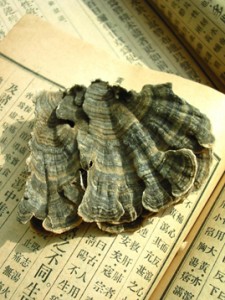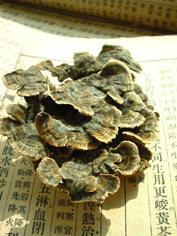Combined health benefits of two famous mushrooms
Cloud Mushroom COV-1® combined with Reishi Mushroom
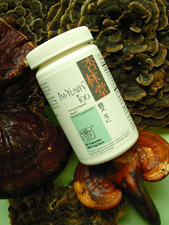 I’m-YunityToo® is a mushroom health supplement that combines the benefits of two well-researched mushrooms containing both cloud mushroom (Coriolus versicolor) and reishi mushroom (Ganoderma lucidum) also known as “lingzhi” mushroom in China. This unique mushroom combination is particularly suitable for individuals who wish to support their immune, mind and cardiovascular health.
I’m-YunityToo® is a mushroom health supplement that combines the benefits of two well-researched mushrooms containing both cloud mushroom (Coriolus versicolor) and reishi mushroom (Ganoderma lucidum) also known as “lingzhi” mushroom in China. This unique mushroom combination is particularly suitable for individuals who wish to support their immune, mind and cardiovascular health.
The cloud mushroom (Coriolus versicolor) is known as Yunzhi 雲芝in China. In Chinese, the first word “yun” 雲
means cloud and the second word “zhi” 芝 refers to a special kind of health supplement mushroom. The name “cloud mushroom” is given because of the interesting wavy ring patterns found on the layers of the mushroom caps. If you look at a cluster of Coriolus versicolor, you would see how these small rings resemble stacks of colored clouds. Reishi or lingzhi mushroom (Ganoderma lucidum) is another well known zhi mushroom in China. The Chinese name “ling zhi” 靈芝 means it is useful for the spirit, mind and soul. Both cloud and reishi mushrooms belong to zhi mushroom categories, which were long regarded by the ancient Chinese as a precious and mysterious health treasures.
Zhi, which is a special kind of health supplement mushroom in Chinese culture, was first recorded by a renowned Traditional Chinese Medicine (TCM) doctor, Li Shi Zhen, in the Bencao Gangmu (Compendium of Materia Medica) during the Ming Dynasty (15th century China.) Old TCM practitioners used mushroom color to classify zhi, which includes mushrooms with green, red, yellow, white, black and purple colors. According to TCM’s five elements theory, green, red, yellow, white and black zhi mushrooms are associated with liver, heart, spleen, lung and kidney qi health respectively while purple mushrooms are related to the health of qi essence. Although zhi mushrooms of different colors have different specialized health benefits in the five organs, they all have common general health benefits. If taken for an extended period of time, these benefits were described in the Compendium of Materia Medica as “keeping our body ‘light’ (being fit and not too unhealthily heavy or fat), preventing (abnormal and unhealthy) aging, and making one live long (healthily and naturally according to life’s aging cycle as life is gifted).” The old TCM practitioners understood centuries ago that zhi are special health supplement mushrooms, which are good for maintaining general health and preserving a normal life-aging process if taken appropriately.
The Chinese character for zhi mushrooms can be found in numerous legends related to the discovery of zhi. Zhi were once regarded by the Chinese as auspicious herbs. Some ancient books said that zhi grew when the king of the country was kind. Some regarded zhi as celestial herbs, because they were rarely found. Some even said that after taking these mushroom herbs, one could become a celestial being. Although these are only folk legends, they give us a rough idea how the ancient China viewed zhi mushrooms. The ancient Chinese believed zhi were special and grown from the “essence of the hills and valleys, clouds and rains, four seasons and the five elements, yin and yang and day and night.” They were something mysterious, precious and not easily found.
Today modern researchers from all fields such as fungi biology, botany, herbology, pharmacology, biology, physiology, biochemistry, Western medcine, TCM medicine, immunology and even oncology are studying these ancient mysterious zhi mushrooms to better understand the health benefits locked inside them. This body of research shows some promising and interesting results in different in-vitro and in-vivo study settings. Well-known examples of well-researched zhi mushrooms include yunzhi (Coriolus versicolor) and lingzhi (reishi /ganoderma lucidium).
Yunzhi (Coriolus versicolor) first caught the attention of researchers in China in 1984 when reputed fungi expert, Professor Yang Qingyao, first successfully identified the optimal COV-1® strain of Coriolus versicolor among 80 identified, isolated and collected strains. This strain is specially cultivated using a deep layer cultivation technology with submerged fermentation. Prof. Yang also made a technological breakthrough in the structural elucidation of polysaccharopeptide (PSP), which is an active ingredient of this mushroom. Using a special extraction method by fractional precipitation with alcohol, specific types of PSP molecules are isolated from this mushroom’s mycelium which are responsible for this mushroom’s health efficacies This complex process of isolating effective PSP molecules is one reason why not all products containing PSP may have similar health benefits.
![]()
In light of the longevity health benefits of zhi mushrooms recorded in the ancient literature, researchers began to ask if these well known effects might be related to our immune function in terms of modern physiology. Today there is consensus among researchers that immunoenhancing effects play a major role in the overall health benefits of zhi mushrooms.
In Chinese Medicine, there is no specific term for “immune”, but, the concept of immune function is incorporated in Chinese Medicine theory based on its holistic concept of balancing. In the Huang Di Nei Jing (The Yellow Emperor’s Classic of Internal Medicine), there is a classic saying, “if normal qi is present inside our body, evils cannot interfere with the body.” Although this sentence looks simple, it illustrates the important and complicated concept of immune function in Chinese Medicine.
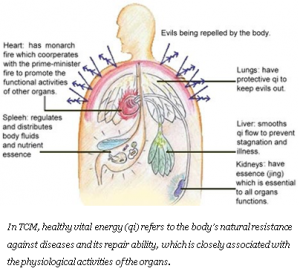 Chinese medicine believes the presence of normal qi is necessary to defend the body against foreign evils. Therefore Chinese medicine focuses on the internal harmony of qi to maintain immune health. This internal harmony encompasses the balance of qi movement throughout the body and the balance of qi in the five organs. If any organ qi gets disturbed, the body becomes susceptible to certain types of evil qi in the environment. As we previously said, in the Bencao Gangmu (Compendium of Materia Medica), Dr Li mentioned that green, red, yellow, white, black and purple zhi mushrooms benefit the liver, heart, spleen, lung, kidney and qi essence respectively. Although further scientific confirmation is needed, the benefits of zhi mushrooms are thought to be related to the regulation of qi in the five organs. At the moment, researchers generally agree that Yunzhi (Coriolus versicolor) belongs to the green and black mushroom category, and therefore, may be closely associated with liver and kidney qi. As the liver can easily attack the spleen, by regulating liver health, Yunzhi may also benefit the health of spleen by harmonizing liver function. It is also agreed that Lingzhi (Ganoderma lucidum) belongs to the red and purple mushroom category, and therefore, may be closely associated with heart qi and qi essence. As heart rules the blood and rules the mind, therefore lingzhi may benefit also the cardiovascular and mind health.
Chinese medicine believes the presence of normal qi is necessary to defend the body against foreign evils. Therefore Chinese medicine focuses on the internal harmony of qi to maintain immune health. This internal harmony encompasses the balance of qi movement throughout the body and the balance of qi in the five organs. If any organ qi gets disturbed, the body becomes susceptible to certain types of evil qi in the environment. As we previously said, in the Bencao Gangmu (Compendium of Materia Medica), Dr Li mentioned that green, red, yellow, white, black and purple zhi mushrooms benefit the liver, heart, spleen, lung, kidney and qi essence respectively. Although further scientific confirmation is needed, the benefits of zhi mushrooms are thought to be related to the regulation of qi in the five organs. At the moment, researchers generally agree that Yunzhi (Coriolus versicolor) belongs to the green and black mushroom category, and therefore, may be closely associated with liver and kidney qi. As the liver can easily attack the spleen, by regulating liver health, Yunzhi may also benefit the health of spleen by harmonizing liver function. It is also agreed that Lingzhi (Ganoderma lucidum) belongs to the red and purple mushroom category, and therefore, may be closely associated with heart qi and qi essence. As heart rules the blood and rules the mind, therefore lingzhi may benefit also the cardiovascular and mind health.
In Western physiology, the immune system is responsible for guarding our body against any foreign body invasions. These foreign bodies include pathological microorganisms such as bacteria, viruses, fungi and toxins. Our immune system also keeps surveillance on any abnormal cells or any abnormal changes in the cells of the body that are recognized as foreign by the immune system. Some research suggests that if these abnormal cells develop mechanisms to escape the recognition and elimination by the immune system, serious health consequences may occur.11 These functions are known as immune defense and immune surveillance respectively.
White blood cells are the main cells that “execute” the immune functions for the body. There are various types of white blood cells taking part in different parts of the immune system. They include the acquired immune system, which can form antibodies and activated lymphocytes that attack and destroy specific foreign organisms or toxins. Cells involved in the acquired immune system include cytotoxic T cells, helper T cells and suppressor T cells. The T lymphocyte system can kill the foreign bodies directly once induced by the antigens of foreign bodies and/ or by the subsequent activation of plasma and “memory” cells of the B lymphocyte system which produce antibodies upon antigen stimulation and activation. There is another innate immune system that does not need antigen stimulation and activation. Cells involved in this non-specific immunity include natural killer cells, macrophages, and neutrophils. These cells act as the first line body defense and can kill the foreign bodies before the activation of the T and B lymphocytes. In addition to immune cells, some small molecular proteins also take part in immune system and help regulate and mediate the activities of the immune cells. These proteins are called cytokines. Interleukins (IL), interferon (IF), tumour necrosis factor (TNF) are examples of cytokines.
![]()
Cloud mushroom content contained in I’m-Yunity Too® is extracted from mycelium of cloud mushroom (Yunzhi, Coriolus versicolor*) with the proprietary cultivation and isolation technique discovered by Prof. Yang Qin Yao. Over the last 20 years, our company group has supported numerous studies including clinical trials on identifying the active ingredient groups of polysaccharopeptide (PSP) and elucidating its immune health benefits in the body.
Phase I4 (21 cases, 1 hospital), Phase II3 (485 cases, 8 hospitals) and Phase III2 (650 cases, 14 hospitals) randomized controlled clinical trials showed that our yunzhi polysaccharopeptide (PSP) supports normal immune function and benefits general well being.2,3,4,5 These results were reflected in the increase in the activity of natural killer cells, 3 increase in the production of interleukin-2 2,3 and increase in the ratio of helper T cells (CD4+) to cytotoxic T cells (CD8+)2,3 in comparison with the control group. The above are all immune cells and proteins responsible for guarding against and killing any foreign bodies and abnormal cells in the body. Their increase suggests our yunzhi polysaccharopeptide (PSP) possess immune supporting benefits and potentially can enhance our immune surveillance. Another clinical study carried out by clinical oncologists successfully showed yunzhi polysaccharopeptide (PSP) was able to maintain white blood cell counts in comparison with a control group,9 and, a recently published phase II (34 cases) 1 double-blind, placebo-controlled and randomized clinical trial reported polysaccharopeptide (PSP) had significant improvement in white blood cells and neutrophil counts, serum Immunoglobin G and Immunoglobin M (two types of antibodies in the serum of blood)(p<0.05).1
Other experimental studies suggest our yunzhi polysaccharopeptide (PSP) can induce the increase of cytokines (immune proteins) such as an increase in a and g-interferon production6 and increase helper T cells (CD4+) under certain experimental conditions.7 Moreover, yunzhi polysaccharopeptide (PSP) was shown to activate macrophages, which secrete tumour necrosis factors and other reactive intermediates to mediate immunomodulatory effects.8 An animal study also suggested yunzhi polysaccharopeptide (PSP) may counteract the depressive effect of certain drugs on white blood cell counts10 and interleukin-2 production.10
![]()
Modern research indicates reishi mushrooms may play a role in certain antioxidant11 and free radical cavenging properties12. Free radicals
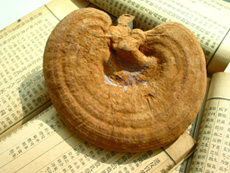
Modern research shows reishi mushrooms support the health of mind, as well as cardiovascular and immune systems.
are highly active substances that can cause oxidative damage to various parts of cells in the body. The antioxidant and free radical scavenging properties can help protect the cells against these damages. Studies also reflect that they may benefit cardiovascular health in our bodies.13, 14, 16, 18 Reishi mushroom is also considered to have mind-soothing properties.15 It has been traditionally used for reducing fatique and stress.15, 17, 18 Besides cardiovascular benefits, immune health is also thought to be supported by this mushroom.17, 18
Ingredients:
| Coriolus versicolor* Mycelium extract form the proprietary COV-1TM strain of the Coriolus versicolor mushroom. Identified active ingredient includes polysaccharopeptide (PSP). |
Yun zhi |
| Ganoderma lucidum | Ling zhi |
* Coriolus versicolor is also known as Trametes versicolor.
Indications:
Supports immune health
Supports mind and cardiovascular health
Maintains general fitness
Precautions:
Do not take this product if you have had an organ transplant. Consult a healthcare provider before taking this product if you are on immunosuppressant medication.
References:
| 1. | Tsang K.W., et al. Coriolus versicolor polysaccharide peptide slows progression of advanced non-small cell lung cancer. Respiratory Medicine. 2003 Jun; 97(6):618-24. |
| 2. | Liu J.X. (1999) Phase III clinical trial for Yun Zhi polysaccharopeptide (PSP) capsules. In Advanced Research in PSP 1999 (Edited by Yang Q.Y.), pp. 295-303. The Hong Kong Association for Health Care Ltd., Hong Kong. |
| 3. | Liu J.X. and Zhou J.Y. (1993) Phase II clinical trial for PSP capsules. In Proceedings of PSP International Symposium (Edited by Yang Q.Y. and Kowk C.Y.), pp. 183-208. |
| 4. | Xu G.M. (1993) Phase I clinical test report of PSP capsules. In Proceedings of PSP International Symposium (Edited by Yang Q. Y. and Kwok C. Y.), pp. 179-182. Fudan University Press, Shanghai. |
| 5. | Xu G.M. (1993) The effect of PSP on improving immunity for gastric cancer patients. In Proceedings of PSP International Symposium (Edited by Yang Q. Y. and Kwok C. Y.), pp. 263-264. Fudan University Press, Shanghai. |
| 6. | Yang J.C. (1999) The stimulative and inductive effects of Coriolus versicolor polysaccharide-peptide (PSP) on interferon. In Advanced Research in PSP 1999 (Edited by Yang Q.Y.), pp. 164-167. The Hong Kong Association for Health Care Ltd., Hong Kong. |
| 7. | Liang Z.Q., Sheng W.H., Wang X.X., Regulatory effect of Coriolus versicolor polysacchariopeptide on human peripheral blood lymphocyte proliferation and T lymphocyte subpopulation. In Advanced Research in PSP 1999 (Edited by Yang Q.Y.), pp. 168-172. The Hong Kong Association for Health Care Ltd., Hong Kong. |
| 8. | Liu W.K, et al, Evidence that Coriolus versicolor polysaccharide acts on tumor cells through an immunomodulatory effect on macrophages. In Advanced Research in PSP 1999 (Edited by Yang Q.Y.), pp. 187-191. The Hong Kong Association for Health Care Ltd., Hong Kong. |
| 9. | Shiu WCT, Leung TWT, Tao M. A clinical study of PSP on peripheral blood counts during chemotherapy. Phytotherapy Research 1992; Vol 6: 217-218. |
| 1 0. | Qian Z.M., Xu M.F., Tang P.L. Polysaccharide peptide (PSP) restores immunosuppression induced by cyclophosphamide in rats. American Journal of Chinese Medicine 1997; Vol XXV, No.1: p27-35 |
| 11. | Zhu M, Chang Q, Wong LK, et al. Triterpene antioxidants from ganoderma lucidum. Phytother Res. 1999 Sep; 13(6):529-31. |
| 12. | Lin JM, Lin CC, Chen MF, et al. Radical scavenger and antihepatotoxic activity of Ganorderma formosanum, Ganoderma lucidum and Ganoderma neo-japonicum. J Ethnopharmacol. 1995 Jun 23; 47(1):33-41. |
| 13. | Terry Williard, Reishi Mushroom. Herb of Spiritual Potency and Medical Wonder. Washington: Sylvan Press 1990; 58-62. |
| 14. | Ibid, 54-55 |
| 15. | Ibid, 68, 86-87. |
| 16. | Berger A, Rein D, Kratky E, et al. Cholesterol-lowering properties of Ganoderma lucidum in vitro, ex vivo, and in hamsters and minipigs. Lipids Health Dis. 2004 Feb 18; 3(a):2. |
| 17. | Wang BX ed. Modern Pharmacological studies on Chinese Medicine. Tianjin Scientific Technology Publishing, 1999: 1079-1088. |
| 18. | Jellin JM, Gregory PJ, Batz F, Hitchens, K, et al. Pharmacist’s Letter/Prescriber’s Letter Natural Medicines Comprehensive Database. 4th ed. Stockton, CA: Therapeutic Research Faculty; 2002:1075-1076. |

